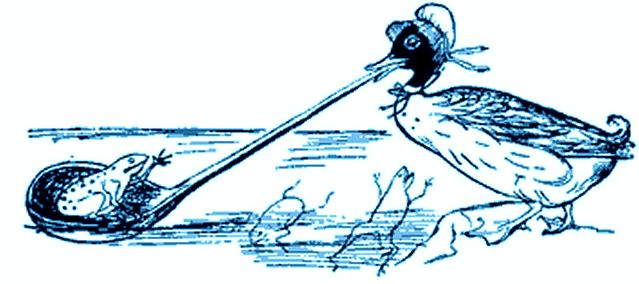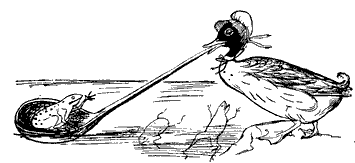They dined on mince and slices of quince,
which they ate with a runcible spoon.
- Generally today a Runcible Spoon is considered to be a forked spoon, akin to a spork, sometimes with one bladed or hooked edge.
- We are most familiar with the word from Laureate of Nonsense Edward Lear’s poem, The Owl And The Pussycat.
Indeed, the word was one of Lear’s favourite inventions. However, his only drawing of a Runcible Spoon, an illustration from the book
Twenty-Six Nonsense Rhymes and Pictures
- is the entry for D
-
- The Dolomphious Duck,
- who caught Spotted Frogs for her dinner
- with a Runcible Spoon
- which clearly shows a long-handled ladle, bearing no resemblance to a spork at all.
- Further, Lear has also used the term ‘Runcible’ in conjunction with hat, cat, wall and goose, in this context ‘goose’ meaning a silly of foolish person, rather than the farmyard bird.
- A great many assumptions and definitions have been attempted. However, without any clear etymology, and with Edward Lear’s penchant for creating nonsense words simply for their pleasant sound, we must assume from the grammar, that something that is runcible, is anything with which one can runce.
- A runce, according to Nathan Bailey’s 1721 An Univerfal Etymological English Dictionary, is a flasket, which is a small flask. A flasket will generally contain some form of alcoholic drink. Thus we may assume that something that is runcible, is a little drunk, a runcible spoon is a spoon from which a little brandy or whisky or similar may be supped.
- You may find this conclusion somewhat farfetched, somewhat nonsensical. A conclusion, with which, anyone with any sense, will find, in the circumstance, completely appropriate.
-
See full story on wikipedia.org


